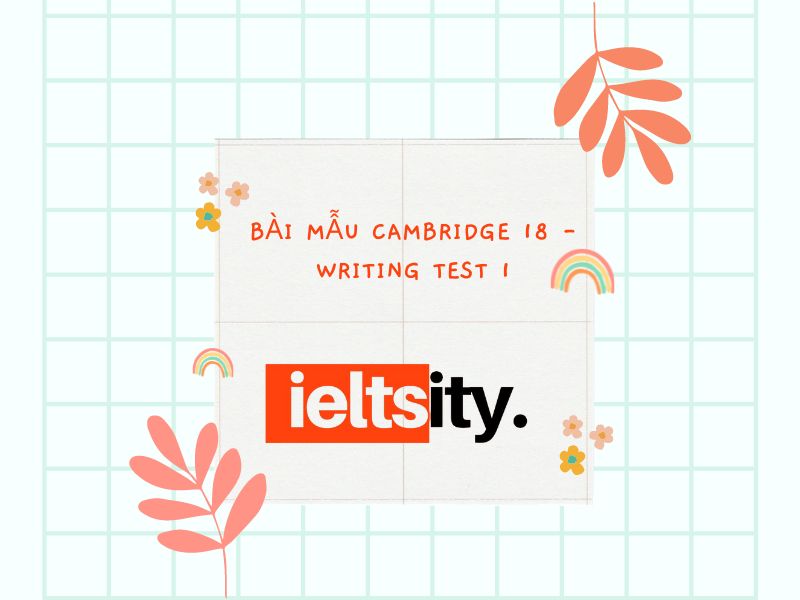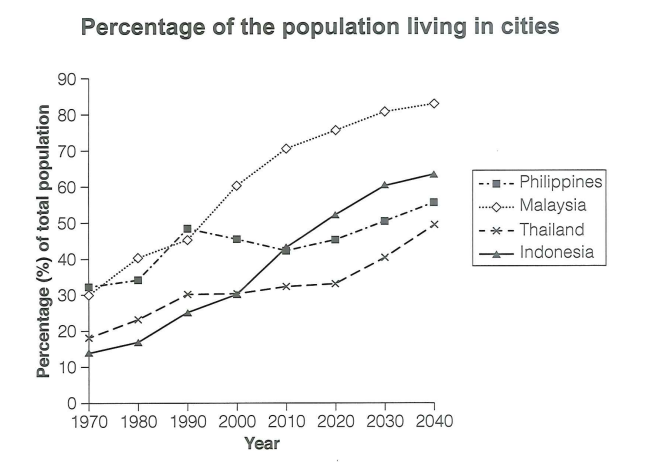Cùng IELTSITY tìm hiểu bài mẫu Ielts Cambridge 18 – Writing test 1 (bao gồm Task 1 và Task 2) ngay nhé!

Writing Task 1:
The line graph compares the proportion of the population of 4 different countries in Asia living in cities between 1970 and 2020, with projections to 2040.

Overall, urban migration appeared to be the trend in all of these countries from 1970 to 2020 and it will continue to be so until 2040. From 1990 onwards, the Philippines consistently recorded the highest percentage of urban population among all the surveyed countries.
For the Philippines, the share of the population living in cities there increased considerably from just over 30% to roughly 50% between 1970 and 1990,followed by a small drop to about 43% in 2010; however, it is then projected to rise back to approximately 55% in 2040. Meanwhile, the figure for Malaysia shows a straight upward trend throughout the period: it started at exactly 30% in 1970 and by 2040, it will have surged to just over 80%.
Turning to Thailand, its statistic climbed slightly from just under 20% to about 30% after the first 20 years, before it remained relatively constant at this level until 2020. Between 2020 and 2040, the percentage of urban population in Thailand is forecasted to go up steadily to roughly 45%. Lastly, there was a gradual increase from about 14% in 1970 to just over 50% in 2020 in the figure for Indonesia and it is also projected to continue rising to around 60% in 2040.
Writing Task 2:
The most important aim of science should be to improve people’s lives. To what extent do you agree or disagree with this statement?
| Essay | Useful Language |
| Many people subscribe to the view that the ultimate goal of science should be the betterment of human lives. From my perspective, I partially agree with this sentiment because while this is reasonable for some scientific fields with certain caveats1, there are other aims that are of equal importance.
It is true that for many sciences, their primary aim should be to improve humans’ lives. For example, in the field of medicine, the end goal of any discoveries should be to find effective treatment for diseases and improve our physical conditions. Nonetheless, claiming that improving people’s lives is of the utmost importance in science is potentially harmful as it implies2 other valid concerns may become secondary to3 this objective. Scientists should not always push for scientific advances if it means that they have to compromise their morals4, such as conducting inhumane experiments on animals.
Furthermore, I would argue that expanding mankind’s knowledge as a goal is equally important and noble in science. There is scientific knowledge, such as those in the field of astrophysics5 and many other social sciences6, that may not have any immediate and tangible7 effects on our day-to-day lives but it helps people make sense of 8 the world around them and push the boundaries of human knowledge. Human beings are curious by nature and we have always seeked to understand the world around us. Without this type of knowledge, our sense of self may falter9, leaving many of us vulnerable to existential crisis10.
In conclusion, while I agree that improving people’s lives ought to be one of the top priorities of science, it should not be achieved at all costs and it is important to acknowledge that pushing boundaries of the unknown is another key reason for scientific pursuit. |
1. caveat (n): lưu ý
2. imply (v): ám chỉ
3. become secondary to something (phrase): trở nên không quen trọng bằng
4. moral (n): đạo đức
5. astrophysics (n): vật lý thiên văn
6. social science (n): khoa học xã hội
7. tangible (adj): hữu hình, có thể chạm vào được
8. make sense of smt (phrase): hiểu được cái gì đó
9. falter (v): lung lay, trở nên không chắc chắn
10. existential crisis (n): khủng hoảng hiện sinh – khi con người đặt câu hỏi về ý nghĩa của sự tồn tại của mình |
Xem Thêm:








